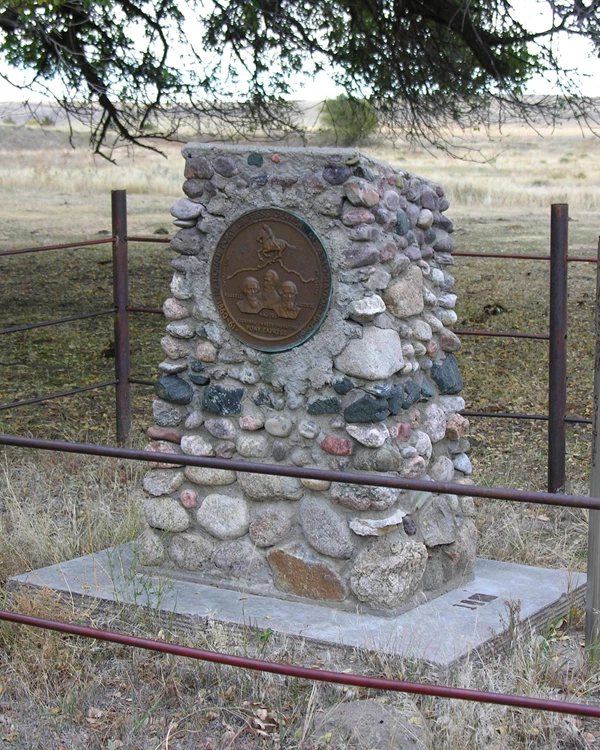Last updated: March 7, 2023
Person
Henry Avis

NPS Photo
Henry Avis got his start with “the horses” at an early age. Throughout his teenage years in the 1850s, Avis regularly travelled from his parents’ home in Kansas City to work in Atchison and Leavenworth, where he had developed a reputation as an expert breaker of wild horses. At the age of eighteen, Avis hired onto a supply train to Fort Laramie. Shortly after arriving in Wyoming in 1858, Avis started carrying the tri-weekly postal service to Salt Lake City from Fort Laramie for J.M. Hockaday & Company. When daily service started, he drove the mail wagon from Mud Springs through Fort Laramie to Horseshoe Creek—a ninety-mile trip. His horsemanship, youthful vigor, and endurance (as well as his small stature) made Avis an ideal rider for the newly-minted Pony Express when it started running weekly mails service between St. Joseph, Missouri, and Sacramento, California, in April 1860.
Avis would become legendary for his fearlessness. When division superintendents for the Pony Express recruited drivers, they applied the same criteria they used when buying horses—fast, young, and cool under pressure. Avis more than fit the bill. He famously covered 220 miles of dangerous terrain in a single ride at a time when other riders refused to do their runs out of fear of conflicts with Native Americans. For this celebrated feat, Russell, Majors, and Waddell rewarded him with a bonus of $300—roughly six months’ pay.
With the completion of the transcontinental telegraph line in late October 1861, the Pony Express ended its services and Henry Avis’s employment as a rider. After an evidently successful stint prospecting for gold in the Far West, Avis returned to Kansas City. Over the next two decades, the former Pony Express rider parlayed his horsemanship into employment as a horse trainer and stable manager. By 1885 he was working for William Mulkey, a wealthy Kansas City resident who owned a stable of racing horses; the Kansas City Times reported that Avis’s skills had earned his employer more than $13,000 in winnings that season. That same year, he married a woman from Virginia named Mollie and began serving as a judge for horse races.
For the rest of his life, Avis appears only sporadically in the historical record. In 1892 he and several fellow horseman met at Chicago’s Palmer House to organize a “protective association for [the] mutual benefit” of men that owned or trained thoroughbred horses. By 1900 Avis had become a horse dealer, and he and Mollie lived in a rented home in St. Louis’ 19th Ward. Sometime in the following decade, the couple moved back to Kansas City and bought a house; by this point, Henry had risen to become an “employer” in the horse business.
In 1917, the seventy-six-year-old Avis talked to the Kansas City Star about his forty-year career as a horse trainer. Avis described himself as “spry as a colt, barring a little rheumatism.” Mollie, who had accompanied Avis “to every track in the country,” sat in her rocking chair while Avis and his fellow horseman, “Johnnie” Martin, recalled the “good old days” of racing in Kansas City. Avis expressed a strong desire to return to the racetrack: “If I could just live long enough . . . I’d get back in the game yet. I’ve got my eye now on two or three as likely three-year-olds as a man could pick up anywhere . . . the horses ain’t gone yet.”
It is difficult to know whether Henry Avis “got back in the game” after that interview. The 1920 federal census showed that Henry had retired and that he and Molly lived in the same home on Prospect Avenue; they had taken in several boarders, most of them younger men. During the Missouri State Fair of 1921, Henry Avis rode through the streets of Kansas City in a parade to celebrate the state’s centennial and represent the “last of the living Pony Express riders.” He died on 20 March 1927 in Kansas City following a bout of “lobar pneumonia,” an infection of the lungs. Avis was interred next to Mollie (who passed away in the winter of 1922–1923) at Mount Washington Cemetery in Independence, Missouri.
(Special thanks to UNM PhD candidate Angela Reiniche for compiling this information.)
